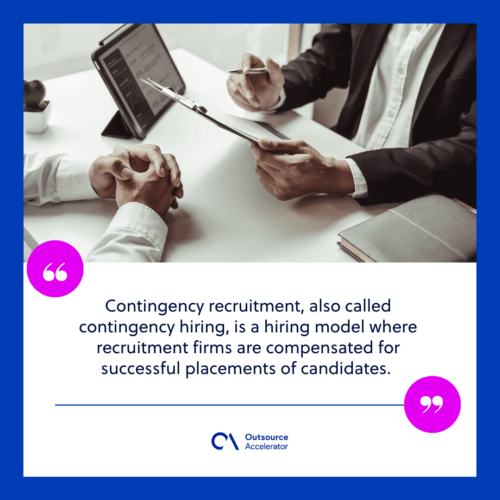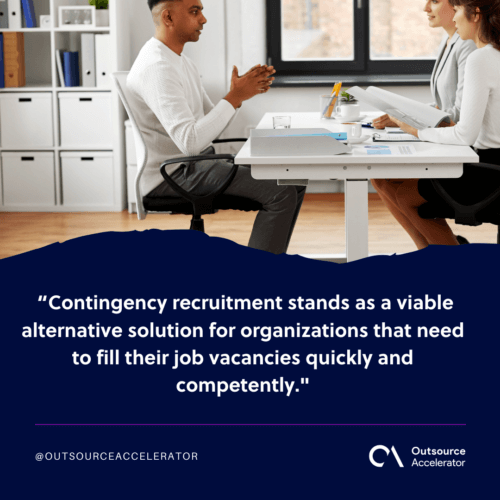What is contingency recruitment?

Businesses face the constant challenge of adapting to unpredictable changes.
Whether spurred by sudden growth, unexpected departures, or special project requirements, the need for new personnel can arise out of the blue.
Contingency recruitment has thus become a vital strategy for organizations looking to fill their talent gaps swiftly. This approach addresses immediate staffing needs and positions companies to thrive in an agile environment.
This article looks at what makes contingency recruitment stand out, including its processes, benefits, and how you can harness its potential.
Defining contingency recruitment
Contingency recruitment, also called contingency hiring, is a hiring model where recruitment firms are compensated for successful placements of candidates. It is known for being flexible, prioritizing fast results, and focusing on achieving outcomes.
This form of recruitment outsourcing only requires payment if the company hires the recruited candidate. The fee for contingency recruitment is typically a percentage of the employee’s first-year salary.
Recruiters are motivated by successful placements to earn their fees. Clients engaging in contingency recruitment may work with multiple recruiters simultaneously to create a competitive setting.

Contingency recruitment vs. Retained recruitment
Let’s take a closer look at what sets contingency recruitment apart from retained recruitment:
| Contingency recruitment | Retained recruitment | |
| Payment structure | Payment is contingent upon successful placement | Clients pay a retainer fee to secure recruiting services |
| Exclusive representation | Multiple recruiting firms may be engaged simultaneously | Typically involves an exclusive arrangement with a single recruiting firm |
| Sourcing approach | Focus is often on speed and filling the position promptly | Takes a more comprehensive and targeted approach |
| Client engagement level | Level of client involvement may vary | Encourages a strong partnership between the client and recruiting firm |
| Search timeframe | Quick turnaround | Slower due to being more thorough |
Understanding these key differences can help organizations choose the recruitment model that best aligns with their specific needs, timelines, and strategic objectives.
How does contingent recruitment work?
Here is a general overview of how contingency recruitment usually works:
1. Initial consultation
The client and the recruiting firm have an initial discussion to agree on the terms of engagement. This will include the fee structure, hiring needs, and any other specific criteria.
The client provides details about the role they need to fill. This information helps the recruitment firm understand the client’s needs and expectations.
2. Candidate search
The recruitment firm then conducts a search for potential candidates. It utilizes various channels, including:
- Professional networks
- Job boards
- Databases
- Referrals
- Social media
A recruitment firm may also use advanced sourcing techniques and tools to identify suitable candidates.
3. Screening and evaluation
Once potential candidates are identified, the firm reviews their resumes, conducts initial screenings, and holds interviews.
This contingency recruitment stage assesses candidates’ qualifications, skills, and fit for the position.
4. Candidate presentation
The recruitment firm then presents a shortlist of qualified candidates to the client company. The business reviews this list and decides which individuals to interview further or consider for the position.
5. Interviews and selection
The client conducts further interviews and assessments to evaluate the candidates and make a hiring decision. Contingency recruitment also grants clients the freedom to choose whether to hire any of the presented candidates.
6. Placement and payment
If the client decides to hire a candidate presented by the recruitment firm, the contingency becomes due.
The fee is typically a predetermined percentage of the candidate’s first-year salary and is paid by the client to the recruitment firm.
7. Post-placement follow-up
Some contingency recruitment firms may provide follow-up services to ensure a smooth transition for the new hire. This could involve checking in with both the client and the candidate to address any issues that may arise during the onboarding process.
The exact process can vary between different recruiting agencies and organizations.
Clients may engage multiple contingency recruitment firms simultaneously to increase the chances of hiring promptly.
Advantages of contingency recruitment
Contingency recruitment offers several advantages for both clients and recruitment firms, making it a popular model in the hiring industry.
Here are some of its key benefits:
- Broad candidate pool – Contingency recruitment firms typically cast a wide net when sourcing candidates, allowing them to maintain a vast network to increase the chances of finding the right fit for a role.
- Cost-effectiveness – This recruitment method is often cost-effective and reduces the financial risk associated with traditional recruitment.
- Flexibility – Contingency recruitment offers great flexibility because companies don’t sign exclusive contracts with recruiters, leading to more options for selecting talent.
- Time-saving – The nature of contingency recruitment encourages a swift and responsive hiring process, allowing hiring managers to focus on other tasks.
- No upfront costs – Clients don’t pay a retainer or upfront fee in the contingency recruitment model, which makes it more accessible for companies without the immediate resources to do so.
- Results-driven – Contingency recruiters are motivated by results as their success is directly related to successfully placing candidates.
- Ideal for specific roles – Contingency recruitment is well-suited for filling specific or niche roles where the demand for candidates may be less predictable.

Disadvantages of contingent recruitment
Contingency recruitment, while offering benefits, also comes with certain disadvantages that clients should consider.
Here are some of the drawbacks associated with contingency recruitment:
- Limited client commitment – Contingency recruiters operate on a project-to-project basis with no long-term commitments to their clients. This can result in a lower level of dedication.
- Minimal understanding of company culture – Contingency recruitment firms may lack firsthand knowledge and experience of their client’s unique traits and values. This can lead to a mismatch in cultural fit.
- Higher turnover rate – Contingency recruitment firms focus on filling vacancies quickly, and this rushed process may result in a higher turnover rate.
- Short-term focus – The short-term emphasis on filling vacancies may not align with a client’s long-term strategic hiring goals.
Despite these disadvantages, many organizations successfully leverage contingency recruitment to meet specific hiring needs.
Some clients may find these disadvantages to be minimal or outweighed by the benefits of contingency recruitment.
Contingency recruitment as an alternative solution
Contingency recruitment stands as a viable alternative solution for organizations that need to fill their job vacancies quickly and competently. With its flexible style, this model has proven to be instrumental for those navigating unpredictable demands.

Striking a balance between leveraging the benefits and mitigating the drawbacks requires careful consideration, communication, and a clear understanding of your goals.
If you assess that contingency recruitment is a worthwhile strategy for your company, it can be a valuable tool in pursuing the right talent.







 Independent
Independent




